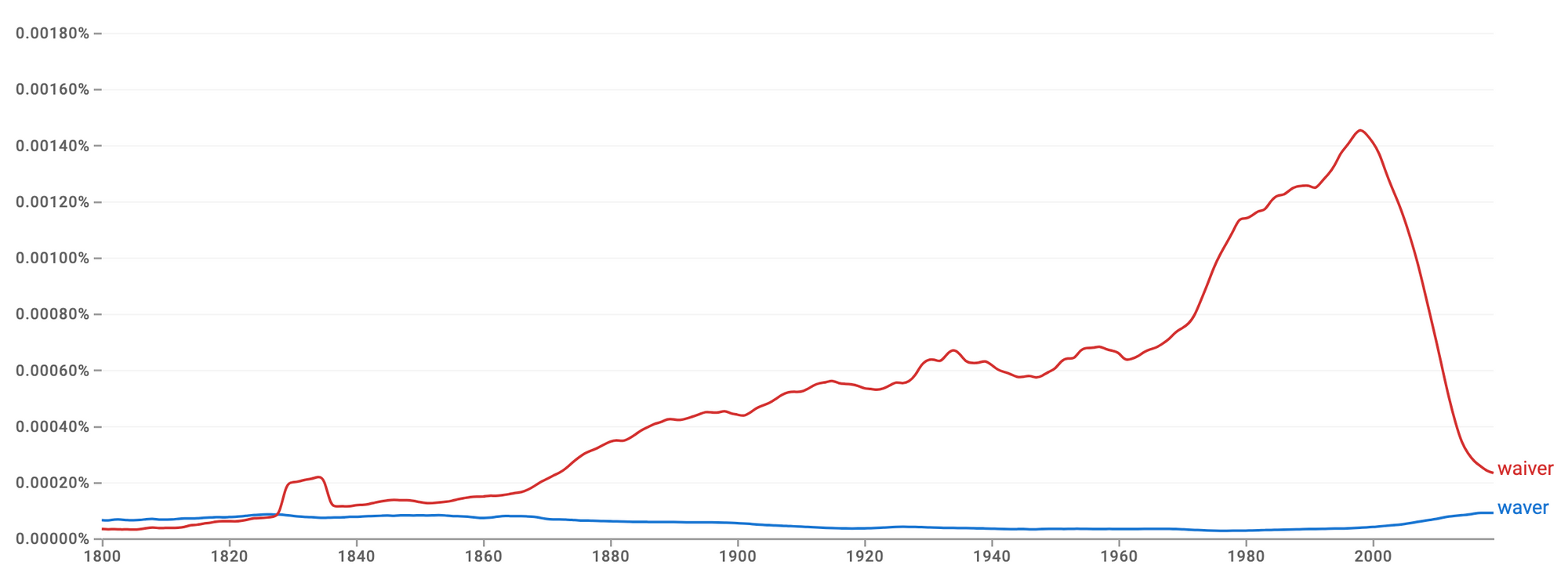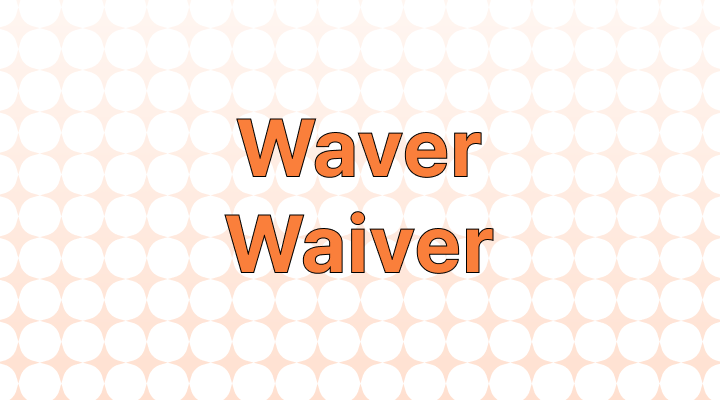- "Waver" means to hesitate, show indecision, or fluctuate in one's opinions, beliefs, or decisions.
- A "waiver" is an intentional and formal relinquishment of a right, claim, or privilege. It is often granted or obtained through written documentation.
🟠 To participate in the event, all attendees had to sign a liability waiver releasing the organizers from any responsibility for accidents.
When to use waver or waiver
The words "waver" and "waiver" have different meanings and uses despite sharing a similar pronunciation, so choosing the right one depends on the context. Here's a breakdown:
When to use waver:
- Waver is a verb.
- Waver is used when there is a sense of indecision, hesitation, or fluctuation in one's stance, as seen in the example sentence.
When to use waiver:
- Waiver is a noun.
- Waiver involves a formal agreement, often documented, where one intentionally gives up a right or releases someone from a liability. To use them correctly, consider the context: if uncertainty or hesitation is involved, go with "waver"; if it involves giving up a right or claim, choose "waiver."
Here's a helpful trick to remember
- Waver: Think of it a wave, which moves up and down. You might similarly wave back and forth on a decision if you waver on it.
- Waiver: A waiver is usually a document or contract that needs a signature, so think of the extra "i" in "waiver" as "I need to sign the waiver".
To use them correctly, consider the context: if uncertainty or hesitation is involved, go with "waver"; if it involves giving up a right or claim, choose "waiver."
Example sentences
Waver
- She didn't waver in her commitment to the cause despite facing numerous challenges.
- The politician's popularity began to waver after the controversial statement.
- The stock prices continued to waver, causing uncertainty among investors.
- Jane tried not to waver in her determination to complete the marathon.
- His confidence seemed to waver as he faced tough questions during the interview.
Waiver
- Before participating in the adventure sport, each participant had to sign a liability waiver.
- The employee signed a non-disclosure waiver to protect the company's sensitive information.
- The school required parents to sign a permission waiver for their children to attend the field trip.
- To join the club, members had to complete a membership form and sign a waiver of liability.
- The athlete submitted a medical waiver to excuse them from certain fitness requirements.
Examples from the web
Waver
"Leaders say their solidarity with Ukraine will ‘never waver'." - The New York Times
"Support cannot waver." - The Guardian
Waiver
"Waivers from export rules" - The New York Times
"The waiver could improve access to coronavirus vaccines." - The Guardian

Usage of waver or waiver
The Ngram graph below shows how often "waver" and "waiver" have been used from the 1800s to the 2000s. Both words have seen use throughout time, but "waver" has seen relatively consistent news while "waiver" saw a peak followed by a steep decline in the 2000s.

FAQ
What does "sign a waiver" mean?
- Meaning: To formally agree to relinquish a right or claim, usually by providing a written and signed document.
- Example: Before participating in the extreme sport, all participants were required to sign a liability waiver.
What does "waver between two options" mean?
- Meaning: To be indecisive or uncertain, fluctuating between two conflicting opinions or choices.
- Example: When choosing a career path, Sarah wavered between her passion for art and the stability of a corporate job.
Summary
So, there you have it! In summary, "waver" is used when there's hesitation or indecision, while "waiver" involves intentionally relinquishing a right or signing off on an agreement. To remember the difference, think of "waiver" as a written "waving" of rights, and use "waver" when there's a sense of hesitation. Go forth and use them confidently in your writing and speech!

Want to sound like a native speaker?
Engram’s AI-powered grammar checker makes your English sound like a native speaker’s, suggesting natural English expressions on top of fixing grammar, spelling, punctuation, word order, and vocabulary.

References:















